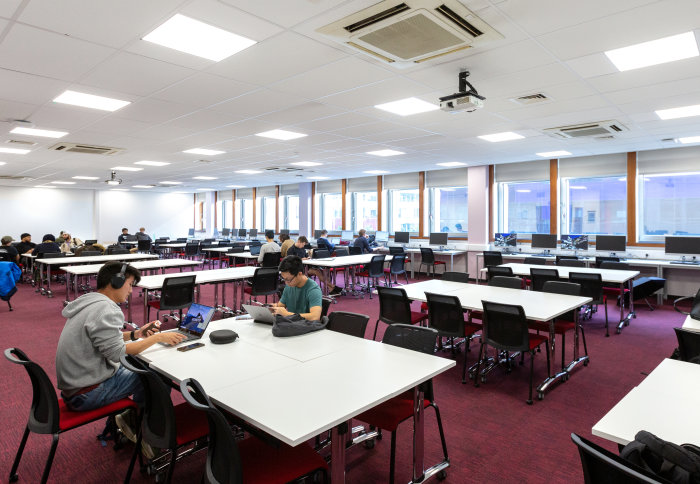Renovation project transforms College teaching and study spaces

Electrical and Electronic Engineering Room 305, post-renovation
Thirty-one teaching and study locations at the South Kensington & Charing Cross campuses have been upgraded, with input from staff and students.
Computing suites, break-out spaces, smaller classrooms and lecture theatres have been included in renovation works over the summer. The College has focussed on improvements which can be delivered speedily and with as little disruption on staff and students as possible.
The thirty-one locations are just some of a number of teaching and study spaces where students, teachers and estates have worked together. The first series of improved spaces opened at the start of the 2018/19 academic year, and attracted positive feedback from teachers and students alike. Two lecture theatres, Blackett LT2 (113) and RSM 147, have also recently been transformed into creative and flexible learning and teaching spaces at the College's South Kensington campus.

Departmental progress

A number of Departments across the College have worked closely alongside the Estates team and architects to ensure that students experience the biggest possible benefits from the improved spaces.
Anusha Sri-Pathmanathan, Department of Chemical Engineering, said: "Staff feedback on the first round of improvements was really good, and as a Department we're looking forward to experiencing even bigger improvements this year.
"We work hard to ensure that our students receive what they need in order to enjoy their experience with us - whether that is personal laptops or a common room. It's important that teaching spaces live up to those same expectations.
"We work in buildings that have high footfall, so anything we can do to ensure that we have maximum flexibility in how we use our space is a big benefit. As we are home to a number of power plants and labs we also need a greater degree of environmental controls compared to many parts of the College."

Vice-Dean (Education) for the Faculty of Natural Sciences, Professor Emma McCoy, said: "Staff and students are starting to feel the impact of more comfortable and flexible teaching and study space across the College’s campuses. It’s good that we are now filling in the ‘gaps’ and ensuring that computing suites, adjoining spaces, and smaller lecture theatres all receive similar levels of investment. These works should result in an environment that is much more likely to bring about a great student experience and improved learning outcomes.”
Student-centred design

Students have been involved throughout the redesign process. 2018/19 Deputy-President (Education), Alejandro Luy, said: "At the Union we closely follow a number of surveys, working groups and anecdotal conversations in order to get a sense of what students need from the College.
"The most recent Student Experience Survey results provided us with the evidence base to discuss a number of issues with the College.
"It was great to be so involved at an early stage of these works. I attended a range of really creative workshops with the architects, and I felt that throughout the process they were taking student input seriously."
"It's important that function comes before aesthetics, and that when the College is thinking about improving teaching spaces it approaches this in an authentic way and asks students for their views."

2018/19 Deputy-President (Clubs & Societies), James Medler, said: "Students are adept at focusing our efforts on improving areas of the College that will have the most impact, such as teaching and recreational spaces. One recent example was when the Union secured £500,000 for improving the Ethos gym.
"It's important that renovations across the university estate improve the overall student experience. It's vital that students take the lead with these projects, as they're the ones actually using these spaces day to day."

Luke McCrone, a PhD student attached to the Centre for Higher Education Research & Scholarship, has been looking into the way students use some of the College's smaller learning and teaching spaces. Luke said: "I'm particularly interested in 'transitional' spaces - areas surrounding lecture theatres that are often characterised as underutilised corridors."
Luke recently wrote an opinion piece concerning his research for higher education policy website, Wonkhe.
Article text (excluding photos or graphics) © Imperial College London.
Photos and graphics subject to third party copyright used with permission or © Imperial College London.
Reporter
Murray MacKay
Communications Division